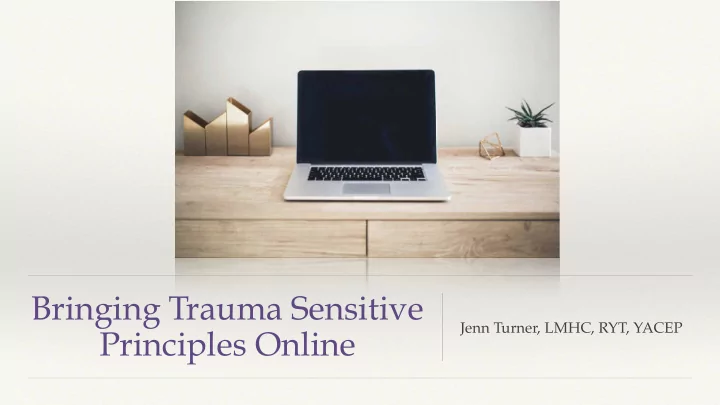

Bringing Trauma Sensitive Jenn Turner, LMHC, RYT, YACEP Principles Online
Who is Jenn? ❖ Trained in Kripalu Yoga ❖ Studied counseling/psychology at Lesley University ❖ Teaches ongoing TCTSY sessions ❖ NIH Research study ❖ Leads trainings throughout the U.S on integrating body into trauma treatment ❖ Currently in private practice integrating body-trauma ❖ Co-founder and co-director at the Center for Trauma and Embodiment
Why Trauma- Why Now? • Relational, intergeneration and systemic trauma impacts our students • These impacts are compounded by COVID, systemic racism, brutality and the loss of agency that many of us are experiencing • Yoga, as delivered in the mainstream prioritizes the experiences of white, able bodied, cis gendered and privileged folx. We can do better.
Domains of a Yoga Session LANGUAGE ASSISTS MOVEMENT FACILITATOR ENVIRONMENT
Online and reopening As many of us continue teaching online but also move to re-open we can consider these domains and how we can make our practices more trauma informed
Language Trauma sensitive language tends to be concrete and visceral. We are not asking trauma survivors to imagine some out of body state (story) but rather to experience what’s happening in their body right now. Trauma sensitive language gently but clearly directs attention and invites mindful moving and breathing so trauma survivors may begin to reclaim their bodies. There are two basic styles of language that we use at the Trauma Center Yoga Program: Language of Interoception and Invitational Language.
Facilitator Qualities • Relational power dynamics • Creating safer spaces • Predictability • Relationship to your own body • Available and ready for feedback • Your identity/experience • What is your motivation?
Shared Authentic Experience between facilitator and student
Shared Authentic experience = creating community • we STILL practice with participants • Ask for input about how sessions are going, and provide multiple avenues for feedback (surveys, email, direct feedback) • Let folks know how you are showing up and how much time you have to give after a session to chat or say hello- hold the frame • The beauty of facilitating is that we are holding a space
Physical Assists We don’t do physical assists: • Power Dynamics-who is in charge of this body • Difficulty localizing skin contact • Difficulty know and describing internal states • Interpretation of sensory stimuli as dangerous • Undermines interoception
Environment • The space in which you are teaching: lighting, mirrors, props, exposed windows, privacy, music, temperature etc. • Always be willing to listen to feedback from students and be willing to respond to reasonable requests to modify the environment. This is an opportunity for folks to have a voice - to be heard and responded to appropriately. • Also a great provides opportunity to practice being predictable ...
Movement • Yoga as means to the goal, not the goal. • Predictable series of forms/limit new material • Explore pacing that balances silence with your voice. You may considering counting or offering noticing cues while holding forms in order to stay connected to students. • Know your students and begin to consider what might be triggering to them.
bonus…… predictability • The familiar sequence of forms or the sound of a teachers voice can be an ANCHOR when we are mid-trauma. We don’t need to manufacture difficulty- this time is already difficult. • Online platforms may be new to folks, and leave participants feeling flustered- clear directions in documents/pdfs that can be saved to devices are best to serve as a reference. • When you can use the same link for a meeting to cut out extra steps • What is the environment that you are in? Consider lighting/background and noise as possible triggers to eliminate. • It makes a difference who is facilitating- if there is someone subbing- let participants know so they have the choice of opting in or out prior to when its starts.
Questions?
Ongoing connection www.jenn-turner.com www.traumasensitiveyoga.com Instagram: @tctsy Facebook: Center for Trauma and Embodiment
Recommend
More recommend